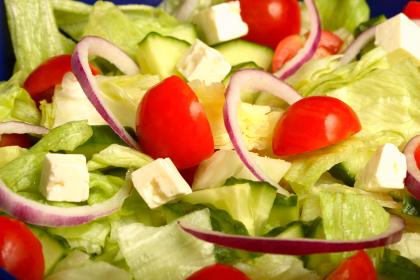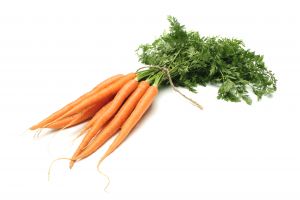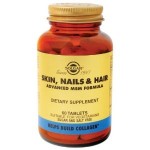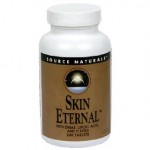You can treat dry skin with creams, oils and lotions to prevent it feeling so parched but you can also help get rid of dry skin by eating the right things.
 And if the right things are not likely to feature in your everyday diet any time soon you can take supplements and vitamins for dry skin instead to keep your skin healthy from the inside.
And if the right things are not likely to feature in your everyday diet any time soon you can take supplements and vitamins for dry skin instead to keep your skin healthy from the inside.
The great thing about this is that you will have a beneficial effect on all your skin in one go, keeping it healthy all over your body so your dry elbows, hands, scalp and knees will thank you for your efforts as well as your face!
Just remember that changes to your eating habits or taking nutritional supplements for the sake of your skin may take a few weeks to be visible in your complexion. Start as soon as you can (after checking your intentions with your doctor) and be patient.
Foods For Dry Skin
Although there are particular foods that help relieve dry skin conditions, those of us who have skin (i.e. all of us) need to be eating a balanced healthy diet to help keep our skin looking its best. That means plenty of fresh fruit and vegetables, lean protein and healthy fats. It also means cutting down on the junk foods, saturated fat, and chemical ingredients that affect your general health, reflected in the state of your skin. Good nutrition = nutrition for dry skin as well as every other type of skin.
But there are some foods which are particularly good for dry skin and most people will also benefit from these. A dry skin diet should contain those foods which are vital in maintaining skin health as well as those which help replenish the oil and moisture in your skin.
Surprisingly 8 out of 10 of us will find our skin becoming excessively dry at some point. Dry skin
It may get worse due to
|
Some of the best foods for dry skin are :-
Fruit and vegetables
Eat as many fruits and vegetables as you can especially those which are rich in Vitamin C such as citrus fruits, blackcurrants, blueberries, broccoli, potatoes, tomatoes, cantaloupe and Brussels sprouts and those rich in vitamin A including carrots, mango, raw spinach, and apricots. A few apricots can help keep iron levels high too and this helps boost skin tone. Garlic and onions are rich in sulfur which helps skin remain smooth.
You always knew that eating a whole variety of fruit and vegetables were essential to your health and from this you can see that they are vital for your skin too. Many of the fruits and vegetables not mentioned here will contribute to the essential vitamins and minerals you need. Aim to eat a whole variety every day to reduce the possibility of nutritional deficiencies.
Healthy fats
An extremely low fat diet can easily lead to dry skin as lipids are essential in creating a barrier to prevent moisture escaping from the skin. That is not to say you need an unhealthy high fat diet to cure your dry skin!
Don’t worry if you’re trying to cut calories, a small quantity of healthy fat is all you need to tip the balance in your favor.
Oily fish (like mackerel, salmon and sardines) are a wonderful source of omega-3 acids which increase the moisture-replenishing properties of the skin. Alternatively linseeds and flax oil are healthy plant based alternatives.
Use safflower, sunflower or corn oil for a good source of omega-6 oils, also important to skin health and suppleness though these are less likely to be deficient in your diet than omega-3.
For optimum vitamin E levels eat fats found in almonds, avocado, hazelnut, pine nuts or sunflower oil. Seeds are good too and sesame seeds are a great source of iron if apricots are not your favorite food.
Eggs and cheese
Eggs and cheese are rich in B vitamins, important in cell growth and division. Alternatives, also rich in this vitamin group, are beef, Marmite or liver.
Hydration for Dry Skin
When looking at foods good for dry skin, it’s important not to forget hydration.
Some skin specialists say it is the most important factor of all and that they can tell who drinks plenty of water just by looking at the skin.
Others say that while severe dehydration is visible on the skin, there is little point in struggling to consume the 2 liters of water every day that is often recommended. They think that you will be fine as long as you drink enough to quench your thirst as it is only the outer layer of the skin that, in fact, keeps moisture in.
Although there is some debate about whether drinking a lot of water actually affects your skin, keeping well hydrated is important for general health
To see how much water you ought to drink every day take a look at this tool which includes an optimum hydration calculator.
Though it can be difficult to drink the amount of water many health professionals and skin specialists recommend, it’s worth trying to drink plenty of fresh water and cutting back on other beverages which leech water from your system in case the ones who recommend lots of water for your health and complexion are right!
Hedge your bets and cut out excess alcohol and caffeine (in coffee, tea and cola) which are not so good for you anyway and replace them with a cool refreshing glass of water.
Vitamins For Dry Skin
It is rarely a vitamin deficiency alone which causes dry skin, but if you get optimum levels from food or from taking vitamin supplements, you are are doing everything possible to treat and cure your dry skin.
Though food is the most natural way to take in essential vitamins, few of us eat a diet that gives us everything we need every day and over time this can lead to low levels of some vitamins that can contribute to skin problems or make existing conditions worse.
You’ll see a number of vitamins discussed above in the section on what to eat for dry skin and if there are whole food groups you don’t like or rarely eat, then take note of the vitamins that you might be lacking in your diet. You can then use supplements if necessary to make up for any deficiency.
The best vitamins for dry skin are :-

Vitamin A: one of the symptoms of deficiency of this vitamin is dry, rough, scaly skin. Unfortunately high doses can be toxic and too much leads to the same kind of skin problems you get with a deficiency. This means balance and moderation are all important when it comes to vitamin A! One strategy is to take vitamin A in the form of beta-carotene, as this is not generally toxic to the body, and can be converted into vitamin A by the liver, when it is required.
Vitamin B Complex: This is actually a group of vitamins including , thiamine (B1), riboflavin (B2) niacin (B3), pantothenic acid (B5), pyridoxine (B6), biotin (B7), Folic Acid (B9) and Cyanocobalamin (B12). These vitamins help with stress conditions and are known for their anti-aging properties. Deficiencies can cause or contribute to dry skin so it is important that you get enough of these vitamins.
Vitamin C: this is involved in the complex process that leads to the formation of collagen (also assisted by minerals zinc and copper). Collagen is involved in new tissue development and helps skin retain moisture.
Vitamin E: helps protect the body from the action of damaging free-radicals and helps in replacing the outer layer of skin. (It can also be used on your skin where it can combat dryness directly. Try Vitamin E oil capsules for this like these capsules which also contain aloe vera).
You can take specific vitamins on a regular basis if you know that your diet is lacking in any of these areas, but don’t overdo it. Unless you think your diet is deficient taking extra vitamins is not necessary, can be detrimental in some cases, and won’t do anything to improve your skin.
If you wish to take a dry skin vitamin supplement, because you know your diet is generally not great and may be making dry skin worse but you can’t pinpoint any particular vitamin, you could try a general multi-vitamin and multi-mineral supplement, to fill in the gaps and make sure you are getting the right elements for general health as well as your skin. Alternatively, you could consider taking one of the special dry skin supplements that contain vitamins below.
Supplements For Dry Skin
Single vitamin supplements to make up for particular deficiencies in your diet or multi mineral/multi vitamin capsules are a great start as far as supplements are concerned. You may also wish to treat dry skin with the following nutritional supplements
- zinc: This mineral is important in supporting the oil-producing glands in the skin.
- l-cysteine: this contains sulfur and helps to maintain the suppleness of the skin
- fish oil: a rich source of omega-3 fatty acids which help replenish moisture
There are also a few specialist skin supplements which have worked wonders for others with dry skin and they are well worth trying although, as with every change you make in food or nutrition you have to persevere for at least a few weeks to see any measurable benefit. Try one of the following
Solgar Skin Nails & Hair Advanced MSM Formula
 This supplement seems to work so well to improve dry skin that those with other skin types complain!
This supplement seems to work so well to improve dry skin that those with other skin types complain!
You may get added benefits too with shinier hair, stronger nails and even fuller lips. If that sounds like too much then check out the reviews on Amazon, which are balanced between those who don’t like the supplement because it made their face oilier and those delighted with the results.
It seems like it is worth trying especially if you suffer from very dry skin on your face, body or scalp.
Source Naturals Skin Eternal
 This supplement has some ardent fans too including one lady who has very dry skin (almost eczema) that normalizes whenever she takes the supplement only to see it reappear when she stops.
This supplement has some ardent fans too including one lady who has very dry skin (almost eczema) that normalizes whenever she takes the supplement only to see it reappear when she stops.
It contains 5 ingredients designed to plump up and protect the skin including DMAE, Lipoic Acid and C Ester.
If you think it could help you (and I’d be tempted if my skin was very dry) you can purchase and see all the reviews yourself here on Amazon.
| Sources and Further Reading: Everydayhealth.com Harvard School of Public Health |